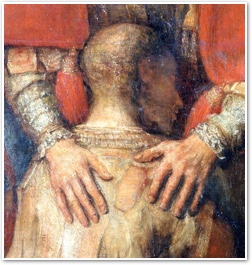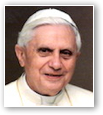Living as Mature Children of God
- POPE BENEDICT XVI
This passage of Saint Luke constitutes one of the peaks of spirituality and literature of all time.
 Indeed, what would our culture, art, and more generally our civilization be without this revelation of a Father so full of mercy? It never fails to move us and every time we hear or read it, it can suggest to us ever new meanings. Above all, this Gospel text has the power of speaking to us of God, of enabling us to know his face and, better still, his heart. After Jesus has told us of the merciful Father, things are no longer as they were before.
Indeed, what would our culture, art, and more generally our civilization be without this revelation of a Father so full of mercy? It never fails to move us and every time we hear or read it, it can suggest to us ever new meanings. Above all, this Gospel text has the power of speaking to us of God, of enabling us to know his face and, better still, his heart. After Jesus has told us of the merciful Father, things are no longer as they were before.
We now know God; he is our Father who out of love created us to be free and endowed us with a conscience, who suffers when we get lost and rejoices when we return. For this reason, our relationship with him is built up through events, just as it happens for every child with his parents: at first he depends on them, then he asserts his autonomy; and, in the end if he develops well he reaches a mature relationship based on gratitude and authentic love.
In these stages we can also identify moments along man's journey in his relationship with God. There can be a phase that resembles childhood: religion prompted by need, by dependence. As man grows up and becomes emancipated, he wants to liberate himself from this submission and become free and adult, able to organize himself and make his own decisions, even thinking he can do without God. Precisely this stage is delicate and can lead to atheism, yet even this frequently conceals the need to discover God's true face.
Fortunately for us, God never fails in his faithfulness and even if we distance ourselves and get lost he continues to follow us with his love, forgiving our errors and speaking to our conscience from within in order to call us back to him. In this parable the sons behave in opposite ways: the younger son leaves home and sinks ever lower whereas the elder son stays at home, but he too has an immature relationship with the Father. In fact, when his brother comes back, the elder brother does not rejoice like the Father; on the contrary he becomes angry and refuses to enter the house.
The two sons represent two immature ways of relating to God: rebellion and childish obedience. Both these forms are surmounted through the experience of mercy. Only by experiencing forgiveness, by recognizing one is loved with a freely given love, a love greater than our wretchedness but also than our own merit, do we at last enter into a truly filial and free relationship with God....
Let us meditate on this parable. Let us compare ourselves to the two sons and, especially, contemplate the Heart of the Father. Let us throw ourselves into his arms and be regenerated by his merciful love.
 This is Meaghen Gonzalez, Editor of CERC. I hope you appreciated this piece. We curate these articles especially for believers like you.
This is Meaghen Gonzalez, Editor of CERC. I hope you appreciated this piece. We curate these articles especially for believers like you.
Please show your appreciation by making a $3 donation. CERC is entirely reader supported.

Acknowledgement
 Pope Benedict XVI. "Living as Mature Children of God." from Angelus, St. Peter's Square (Libreria Editrice Vaticana, March 14, 2010).
Pope Benedict XVI. "Living as Mature Children of God." from Angelus, St. Peter's Square (Libreria Editrice Vaticana, March 14, 2010).
Reprinted with permission of Libreria Editrice Vaticana.
The Author

 Pope Benedict XVI is the author of Jesus of Nazareth, Vol II, Jesus of Nazareth, Vol I, Caritas in Veritate: Charity in Truth, Saved in Hope: Spe Salvi, God Is Love: Deus Caritas Est,The End of Time?: The Provocation of Talking about God, Truth and Tolerance: Christian Belief and World Religions, Without Roots: The West, Relativism, Christianity, Islam, Salt of the Earth: An Exclusive Interview on the State of the Church at the End of the Millennium, God and the World: Believing and Living in Our Time, In the Beginning: A Catholic Understanding of the Story of Creation and the Fall, The Spirit of the Liturgy, The Ratzinger Report: An Exclusive Interview on the State of the Church, Introduction to the Catechism of the Catholic Church, Introduction to Christianity, Called to Communion: Understanding the Church Today, Milestones: Memoirs 1927-1977, Behold the Pierced One, and God Is Near Us: The Eucharist, the Heart of Life.
Pope Benedict XVI is the author of Jesus of Nazareth, Vol II, Jesus of Nazareth, Vol I, Caritas in Veritate: Charity in Truth, Saved in Hope: Spe Salvi, God Is Love: Deus Caritas Est,The End of Time?: The Provocation of Talking about God, Truth and Tolerance: Christian Belief and World Religions, Without Roots: The West, Relativism, Christianity, Islam, Salt of the Earth: An Exclusive Interview on the State of the Church at the End of the Millennium, God and the World: Believing and Living in Our Time, In the Beginning: A Catholic Understanding of the Story of Creation and the Fall, The Spirit of the Liturgy, The Ratzinger Report: An Exclusive Interview on the State of the Church, Introduction to the Catechism of the Catholic Church, Introduction to Christianity, Called to Communion: Understanding the Church Today, Milestones: Memoirs 1927-1977, Behold the Pierced One, and God Is Near Us: The Eucharist, the Heart of Life.




